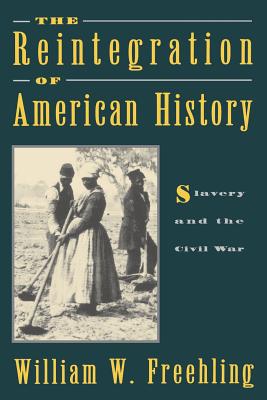

 Oxford University Press, USA
Oxford University Press, USA
The Reintegration of American History: Slavery and the Civil War


Key Metrics
- William W Freehling
- Oxford University Press, USA
- Paperback
- 9780195088083
- 9.2 X 6.13 X 0.91 inches
- 1.09 pounds
- History > United States - Civil War Period (1850-1877)
- English
 Secure Transaction
Secure TransactionBook Description
This provocative collection of essays, all of them new or thoroughly revised, synthesizes thirty years of Freehling's writing and reflection on the nature of slavery and the causes of the Civil War. He offers a fascinating look at subjects such as the nonradical nature of the American Revolution, as seen in the Founding Fathers' chary manner in promoting the antislavery cause. He illuminates the problematic concept of a paternalism which supposedly harmonized liberty for slaveholders (those who could protect themselves) with protection for slaves and impoverished whites (those who would allegedly fail as free men). Freehling then considers slaveholders' attempts to reconcile slavery with democracy and thus formulate a coherent world view, especially as seen in the strained ideologies of John C. Calhoun, George Fitzhugh, and James Henley Thornwell. In an important new interpretation of slave resistance, such as the Denmark Vesey uprising of 1822 (which sought to undercut this paternalistic reconciliation of democracy and slavery), he describes rebellious slaves' success in casting doubt on the compatibility of democratic and authoritarian realms, and fugitive slaves' success in provoking Civil War and emancipation. Stressing the need for a new synthesis of American history both chronologically and topically, Freehling explains why the Civil War came, relating it to the American Revolution and the reasons why the Confederacy lost the Civil War. Likewise, the nature of slavery as a social institution is connected with the nature of pre-war politics and to the outcome of wartime military encounters.
Enhanced with brief introductions, the essays lay out the design of a new multicultural history of the United States, one which emphasizes the way African Americans, white women, and white men condition each other and foster social and political change.
Author Bio
William Freehling grew up in Chicago, received his A.B. degree Magna Cum Laude and Phi Beta Kappa from Harvard College (where he wrote his honors thesis under Arthur Schlesinger Jr.), and his M.A. and Ph.D. from the University of California, Berkeley (where he wrote his Ph.D. thesis under Kenneth Stampp). He has taught at Berkeley and Harvard, held full professorships at Michigan and Hopkins, and endowed chairs at SUNY, Buffalo and at Kentucky.
Now retired from a university career that brought him as many honors for teaching as for books, Mr. Freehling currently writes full time at the Virginia Foundation for the Humanities as a permanent Senior Fellow. His latest publication is Showdown in Virginia: The 1861 Convention and the Fate of the Union (2010). His current projects include a sesquicentennial book of essays on the cause of the American Civil War and a biography of Abraham Lincoln.
In 2007, the Oxford University Press published the second and concluding volume of Professor William W. Freehling’s Road to Disunion, subtitled Secessionists Triumphant, 1854-1861 (a main selection of the History Book Club, a Washington Post Notable Book of the year, a New York Times Sunday Book Review Editor’s Choice, and winner of the Hodges Prize).
The first volume of Road to Disunion, subtitled Secessionists at Bay, 1776-1854 and published in 1990, was also a History Book Club main selection and was winner of the Owsley Prize. Together with The South versus the South: How Southern Anti-Confederates Shaped the Course of the Civil War (appearing in 2002 and winner of the Jefferson Davis Prize), The Road to Disunion reinterprets the causes of the Civil War and of Confederate defeat.
These books, researched on a Guggenheim Foundation fellowship, bring to climax a lifetime’s work on the Old South, begun forty years ago with the publication of Prelude to Civil War; The Nullification Controversy in South Carolina (winner of the Nevins and Bancroft Prizes).
Source: John Simon Guggenheim Memorial Foundation
Videos
No Videos
Community reviews
Write a ReviewNo Community reviews